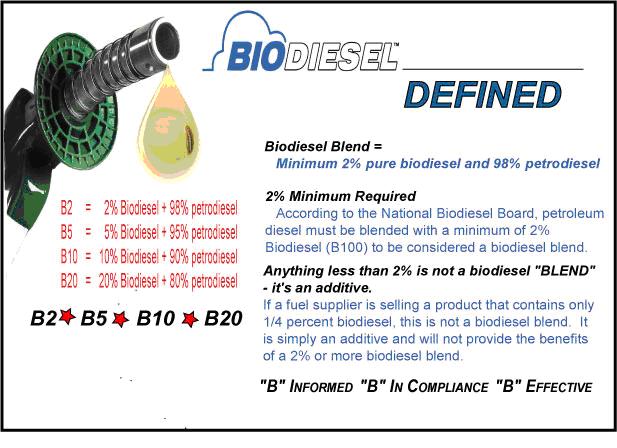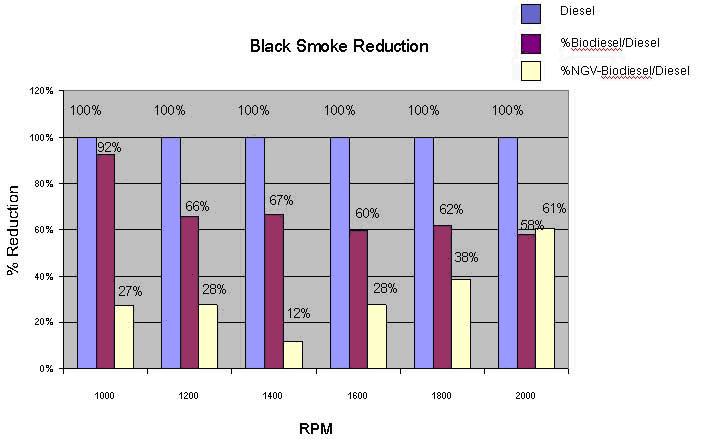OVERVIEW
Rudolph Diesel actually invented the diesel engine to be used with
a variety of vegetable oils, most notably peanut oil. Diesel demonstrated
his engine at the Exhibition Fair in Paris, France in 1898. This engine
stood as an example of Diesel's vision because it was fueled by peanut
oil - the "original" biodiesel. However, due to the availability
of cheap petroleum, the bio-fuel was largely ignored. But now that
we are encountering the costs associated with our petroleum dependence,
bio-fuel is being looked at more carefully.
Biodiesel fuel is reliable and renewable. It can be used in any
Diesel engine. Even a small amount of biodiesel mixed with petroleum
increases the fuel lubricity, which is how a fuel lubricates the
fuel system and engine. The biodiesel additive has replaced sulfur
dioxide, which was a component of acid rain. Biodiesel is much safer
and performs just as well. Even a mixture of 20% biodiesel, a B20,
reduces emissions considerably, is reasonably priced, and requires
no engine modifications. Because it can be made from used cooking
oil, an abundant waste product, biodiesel is much cheaper to make.

Biodiesel has a positive energy balance, 2.5 units of energy, because
it is an efficient carrier of solar energy. This has been determined
by adding all the quantities of energy consumed in each step together.
The total energy needed to produce a gallon of biodiesel is then
compared to the energy contained in the gallon of biodiesel, which
is a higher ratio than that of fossil fuels. However, the total
energy in biodiesel is 12% less than diesel fuel, yet it still produces
similar power and torque and no noticeable difference in performance
is noted.
Biodiesel is 100% biodegradable and non-toxic. Degrading four times
faster than petroleum, biodiesel is almost completely gone after
3 weeks, making it much safer for sensitive environments. It also
increases the life of diesel engines, so your vehicle lasts longer,
and releases a pleasant odor of french fries or donuts. Because
biodiesel exhaust is free of lead, sulfur dioxide, halogens, and
has reduced particulates, unburned hydrocarbons, carbon monoxide
and dioxide, it makes it that much safer.
Due to its high flashpoint (ignition temperature), biodiesel is
safe to transport. It will not spontaneously explode or ignite under
normal circumstances, making it even safer than petroleum.
Summary
Biodiesel is:
• good for your engine (increases lifespan)
• cheap to make, recycles a waste
• energy storage per gallon is just as good and gives similar
power
• safe for environment, releasing no toxins
• safe to transport
BIODIESEL EMISSIONS
Biodiesel emissions are substantially lower than petroleum diesel
emissions. It actually reduces most of the emissions of a diesel
engine. Its stats include:
• 100% reduction of carbon dioxide
• 100% reduction of sulfur dioxide
• 40-60% reduction of soot
• 10-50% reduction of CO
• 10-50% reduction of hydrocarbon emission
• 97% reduction of carcinogenic PAH’s such as phenanthren
• 56% reduction of benzofloroanthen
• 71% reduction of bezapyren

However, biodiesel does not reduce the emission of nitrous oxide,
which is created when nitrogen is burned or oxidized. Yet, this
is true with any fuel used, but newer engines will produce less
nitrous oxide than older, out-of-tune engines. The addition of a
catalytic converter will also reduce NO emissions.
ECONOMICS
The use and production of biodiesel just makes sense. It can be
created from used vegetable oil, waste cooking oil, or even animal
tallow. None of these sources is more expensive than using fossil
fuels. In fact, they are either the same or cheaper. The benefit
of using it, however, would be that we wouldn’t have to use
up fossil fuels or import them from other countries. It could be
homegrown, causing a reduction in the national trade deficit.
Three billion gallons of fast food restaurant cooking oil in the
U.S. is being wasted and thrown away. It causes damage and costs
millions to clean up. One billion gallons of animal fat per year
is being produced that could be used to make biodiesel.
Vegetable oil by itself is expensive it bought in a store. This
is done on purpose to keep the price of certain farm products, like
vegetable oil, from dropping. It is so that farmers do not overproduce
crops and thereby bring food prices down. Some farmers are actual
paid by the U.S. government not to grow crops. Sixty million acres
per year are left to fallow due to government programs. A study
at the University of North Dakota estimated that “when the
money from increased farm yields was spent and re-spent throughout
the economy, it would result in an increase of $131 per acre in
gross business volume.” That would be about $2.5 billion a
year for sixty acres.
OTHER USES
Biodiesel is not only a good fuel source, but it can also be used
as a kerosene substitute for heaters, lanterns, and stoves. It can
also be substituted for home heating oil, a solvent for non-automotive
paint, or cleaner for engine parts. It can be an all-purpose machinery
lubricant, a cleaner for petroleum spills on land or water, and
it can be used as a non-toxic crop adjuvant.
|

